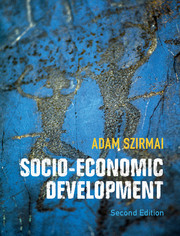Description
Socio-Economic Development (2nd Ed., Revised edition)
Author: Szirmai Adam
Taking a comparative and multidisciplinary approach, this textbook offers a non-technical introduction to the dynamics of socio-economic development and stagnation.
Language: English
Subject for Socio-Economic Development:
Publication date: 06-2015
791 p. · 19.2x25.1 cm · Hardback
Out of Print
791 p. · 19.2x25.1 cm · Hardback
Out of Print
Description
/li>Contents
/li>Biography
/li>
Why are poor countries poor and rich countries rich? How are wealth and poverty related to changes in health, life expectancy, education, population growth and politics? This non-technical introduction to development studies explores the dynamics of socio-economic development and stagnation in developing countries. Thoroughly updated and revised, this second edition includes new material on the effects of the 2008 financial crisis, the emergence of the BRICS economies, the role of institutions in development and the accelerated growth of economies in Africa and Asia. Taking a comparative approach, Szirmai places contemporary debates within their broader contexts and combines insights and theories from economics, economic history, political science, anthropology and sociology. Each chapter includes comparative statistics and time series for thirty-one developing countries. Assuming no prior knowledge of economics, this book is well-suited for students in interdisciplinary development studies and development economics, for policy-makers and for practitioners pursuing careers in developing countries. Visit www.dynamicsofdevelopment.com for additional resources.
Preface; Acknowledgements; List of acronyms and abbreviations; 1. Developing countries and the concept of development; 2. Development of the international economic order, 1450–2015; 3. Growth and stagnation: theories and experiences; 4. Technology and development; 5. Population and development; 6. Health, healthcare and development; 7. Education and development; 8. Economic development, structural change and industrialisation; 9. Industrial development; 10. Agricultural development and rural development; 11. State formation and political aspects of development; 12. Cultural and institutional dimensions of development; 13. The international economic and political order since 1945; 14. Foreign aid and development; References; Author index; Subject index.
Adam Szirmai is Professorial Fellow at the United Nations University Maastricht Economic and Social Research Institute on Innovation and Technology (UNU-MERIT) and Professor of Development Economics at Maastricht University. His research focuses on the determinants of long-run growth, catch up and stagnation in the developing world, with particular emphasis on the role of the manufacturing sector. A second focus of his research concerns the relationships between innovation, technological change and economic growth.
© 2024 LAVOISIER S.A.S.




